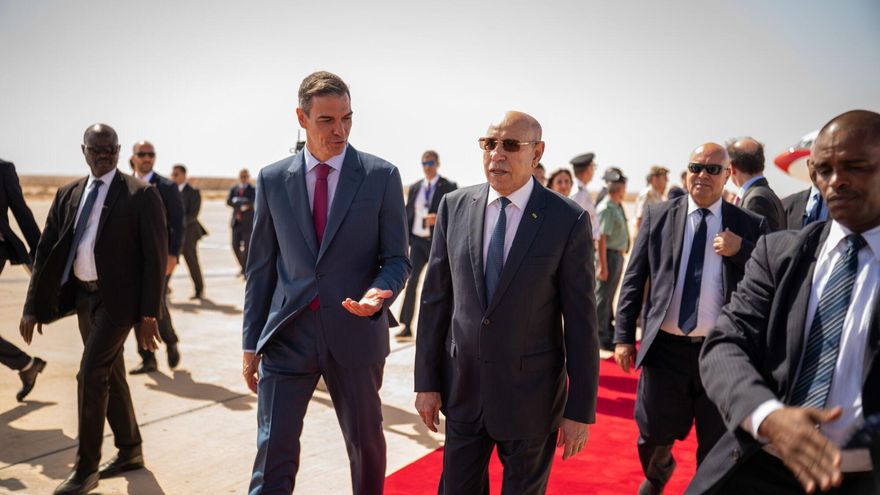A brutal beating at the border
“The Mauritanian army beat us with sticks and a rubber whip. I had never seen such brutal behavior,” recounts Marco Gibson, a Liberian citizen who was assaulted and expelled to a dangerous area on the Mali border. His is just one of many testimonies gathered in the Human Rights Watch (HRW) report, titled ‘They Accuse Me of Trying to Go to Europe’. The report documents a pattern, from 2020 to 2025, of arbitrary detentions, torture, rape, extortion, and mass expulsions perpetrated by Mauritanian security forces with financial and logistical support from the European Union and Spain.
Mauritania: Europe’s invisible and violent wall
Mauritania has become an invisible and violent wall for the thousands of people trying to reach the Canary Islands via the Atlantic route. The repression is recounted in first-person accounts. The study compiles stories from migrants and alleged human traffickers who report being beaten, locked up in inhumane conditions, or deported to desert areas without water or food.
One man detained by police described his experience during interrogations to HRW: “They took off my clothes and beat me. They used electric shocks on me… They said I was helping people get to Spain.” Some migrants pointed to the possible involvement of European actors in these interrogations. One Senegalese man recounted that after being falsely accused of trying to reach Europe, he was questioned while “a white man, in plain clothes, listened as the police chief asked questions.”
The spillover effect on local communities
The violence is not confined to detention centers. It also spills over into the local communities that live with the constant pressure of migration. A Senegalese fisherman interviewed in Nouakchott confessed to researchers the toll his community has endured since Mauritania began receiving European money: “Since Europe put up money to control migrants, we are very tired… If the authorities arrest us, they mistreat us.”
European complicity in human rights abuses
The humanitarian organization warns that Brussels and Madrid are “complicit” in these abuses by turning the African country into a border gendarme without ensuring minimal human rights protections. In the first half of 2025 alone, over 28,000 people were forcibly expelled—a figure that triples the number from 2019.
The report underscores that these practices have intensified as European funding has increased. Over the last two years, this funding has paid for patrol boats, vehicles, detention centers, and surveillance systems financed by Spain and the European Commission.
The direct impact on the Canary Islands
From the perspective of the Canary Islands, this diagnosis has a direct reading. The archipelago, Europe’s southern border, has received record numbers of arrivals in recent years: over 47,000 in 2024 and 12,126 in just the first eight months of 2025. Every cayuco (wooden boat) that reaches the islands carries not only the risks of the ocean but also the traces of violence suffered previously on dry land.
Reception centers in the Islands are forced to care for people with severe trauma, many of them unaccompanied minors, who have survived beatings and abuse in Mauritania before risking their lives on the Atlantic.
A repeated pattern of border externalization
Border externalization is not a new European strategy, but the HRW report demonstrates how its consequences fall harshly on border regions like the Canaries. Spain and the EU have bet on transferring control to third countries under the premise of containing migratory flows, even while knowing these states lack democratic guarantees and protection systems.
Italy has replicated this model with agreements in Libya and, more recently, in Albania, which has provoked strong criticism from the Council of Europe over the maltreatment and inhumane conditions in detention centers. The pattern repeats itself: Europe fortifies its borders but outsources the responsibility for the lives of those seeking refuge.
Funding a crackdown
In February, Spanish Prime Minister Pedro Sánchez traveled to Nouakchott alongside European Commission President Ursula von der Leyen to seal an agreement with leader Mohamed Ould Ghazouani. Spain committed 210 million euros and the Commission another 300 million to reinforce security and migration control.
The data shows that arrivals to the Canary Islands subsequently fell by 52% compared to the same period the previous year, but the real price has been paid by the migrants. Organizations like the Spanish Commission for Refugee Aid (CEAR) emphasize that the HRW report is no surprise; they have long been collecting consistent testimonies from refugees describing beatings, raids, and arbitrary deportations.
The paradox of political success
The paradox, as denounced by NGOs and experts, is that the declining arrival numbers are showcased as a political success while systematic human rights violations are rendered invisible. Mauritania, which received one million migrants in 2024 alone—many from not only the Sahel but also Asia—faces an internal migration crisis that its government manages with a heavy hand, now backed by European economic support.
An ethical dimension for the Canary Islands
From the Canary Islands, where the constant arrival of cayucos has created tensions between the regional and central government over the management of unaccompanied minors, the report adds an ethical dimension to the debate. The Atlantic remains an open cemetery, but HRW reminds us that the tragedy begins before embarkation: in the police stations, deserts, and detention centers of Mauritania.
By funding this system, Europe and Spain are not just outsourcing migration control—they are outsourcing violence. The Canary Islands, as a European frontier, receives the echo of this failure every single day.

